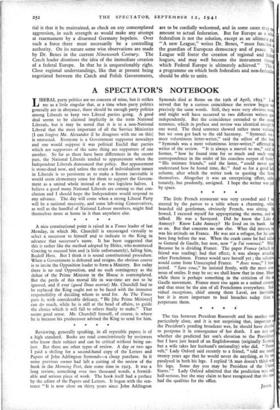Reviewing, generally speaking, in all reputable papers is of a
high standard. Books are read conscientiously by reviewers who know their subject and can be critical without being un- just. But there are other types of review. A day or two ago I paid a shilling for a second-hand copy of the Letters and Papers of John Addington Symonds—a cheap purchase. In it some previous owner had left a cutting of the review of the book in the Morning Post, date some time in 1923. It was a long review, something over two thousand words, a formid- able and serious piece of work. The book itself had a preface by the editor of the Papers and Letters. It began with the sen- tence "It is now close on thirty years since John Addington Symonds died at Rome on the 19th of April, 1893." I served that by a curious coincidence the review began precisely the same words. Still, they were very obvious we and might well have occurred to two different writers q independently. But the coincidence extended to the sec sentence, which in preface and review was identical except f one word. The third sentence showed rather more variati but we soon got back to the old harmony. "Symonds was most voluminous letter-writer," said the editor of the b "Symonds was a most voluminous letter-writer," affirmed writer of the review. "It is always a marvel to me," said former, "how he found time for so much and such correspondence in the midst of his ceaseless output of books. "His intimate friends," said the latter, "could never qui understand how he found time, &c." And so for a good column, after which the writer took to quoting the lett themselves. Altogether it was an enterprising effort, odor tunately, but prudently, unsigned. I hope the writer was p by space.


























 Previous page
Previous page